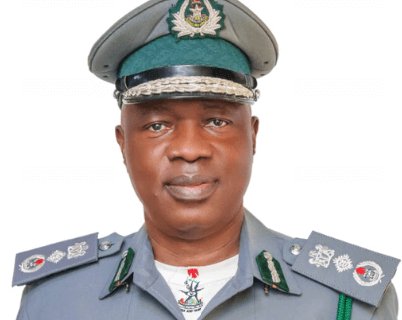
Wale Adeniyi, Customs boss
Customs collaborates with FRCN on public enlightenment
The Nigeria Customs Service (NCS) has expressed its commitment to strengthening collaboration with the Federal Radio Corporation of Nigeria (FRCN) to educate Nigerians about the core mandates of the Service and its role in economic development.
During a meeting with a delegation from FRCN, led by Director-General Muhammad Bulama, on Tuesday, March 26, 2024, in Abuja, the Comptroller-General of Customs, Bashir Adewale Adeniyi MFR, underscored the importance of media partnerships in amplifying the efforts of the Service.
CGC Adeniyi highlighted the effectiveness of media collaboration in reshaping the narrative of trade in Nigeria and emphasized the need to inform Nigerians about the various initiatives implemented by the NCS to enhance international trade efficiency.
“We are doing a lot more than people know us for, and this is why we feel necessitated to embrace this offer of strategic partnership that you have extended to us, to reach out to Nigerians, and let them know those things that we are doing, which ordinarily, they don’t know,” CGC Adeniyi stated.
In response, DG Bulama congratulated CGC Adeniyi on his appointment and commended the progress made by the NCS under his leadership.
He emphasized the importance of partnership between FRCN and NCS in promoting the activities of the Customs Service and contributing to Nigeria’s growth and development.
“We are convinced that it is no longer the era of us just sitting down in our office and believing that Nigerians know what we are doing. We are not taking our mandate lightly.
“We thought that we should come so that together, we can collaborate to help our country realize its potential and greatness,” DG Bulama remarked.
Meanwhile, CGC Adeniyi recently announced a significant initiative to enhance trade facilitation by installing advanced scanners at the nation’s seaports.
Adeniyi revealed the ambitious plan during a recent dinner at the NCS headquarters in Abuja for diplomats, including representatives from the British High Commission, the United States, Germany, the United Nations Office on Drugs and Crimes, and the World Bank.
Minister commends progress on Lagos-Calabar coastal highway
The minister of works, Engr. David Umahi has expressed satisfaction with the quality and pace of work on the Lagos-Calabar Coastal Highway.
Describing the Lagos-Calabar Coastal Highway as one of the most critical projects in the works sector and a vital national economic pillar, Senator Umahi emphasized the importance of providing economically viable towns along the highway.
”The progress on the Lagos-Calabar Coastal Highway is due to our commitment to infrastructure development and economic growth.
”The Federal Government is engaging with host states to secure land for these towns, enabling communities near the highway to benefit economically from the project,” he said.
During a briefing with journalists, Umahi outlined the technical aspects of the construction process, noting progress in dredging, excavation, dewatering, sand filling, placement of crushed stone base, cement stabilization, drainage, and culverts.
He assured that the first phase of the highway would be completed within 36 months.
The minister also announced plans for a train station at the Ikorodu junction, providing a link to the Ikorodu-Sokoto Highway.
Senator Barinada Mpigi, the chairman of the Senate Committee on Works, and Hon. Akin Alabi, the chairman of the House Committee on Works, both promised during the inspection visit that the National Assembly would never waver in its support of securing appropriations money to guarantee the project’s prompt completion.
Federal Controller of Works, Lagos State, Engr. Mrs. O. I. Kesha assured the minister of round-the-clock supervision that the project would meet specifications and be completed promptly.
Recall that the minister recently stated that the federal government has decided to prioritize rigid concrete pavement over traditional asphalt overlay in constructing federal roads across the country.
Umahi highlighted several reasons behind the strategic shift, with durability and cost-effectiveness at the forefront.
He explained that concrete technology offers a more resilient and cost-efficient solution compared to asphalt, which has faced challenges related to cost escalation.
